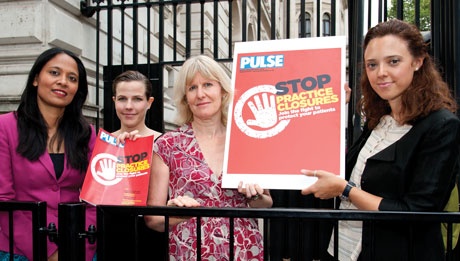Practice closures set to widen GP privatisation

Pulse has learned the full implications of scores of practices facing closure could include a mass privatisation of GP services.
NHS England has admitted its policy is that any new contracts to replace closed practices will be APMS following a full procurement process. The GPC has described this as signalling the ‘death knell’ for traditional general practice, and is seeking urgent legal advice about the move.
Other leaders have warned it will lead to GP surgeries being replaced by ‘short-term, profit-making ventures’ but managers insist competition rules mean they have no choice but to use APMS contracts, even when reprocuring GMS or PMS contracts.
APMS contracts have a chequered history. They were introduced in 2004 to open up primary care to ‘new providers’ and were famously used to procure the Labour government’s ill-fated ‘Darzi’ centres across the country.
In October last year, Pulse revealed that NHS England’s London area team was planning to procure a ‘significant’ number of APMS contracts this year.
NHS managers now say this policy has been adopted nationally.
Under Section 75 of the Health and Social Care Act, commissioners must put services out to full procurement unless it can be proved there is only one potential provider for the service.
NHS England also says an APMS contract does not carry the ‘risks’ associated with GMS contracts.
A spokesperson told Pulse: ‘Under the GMS regulations there is scope to enter into a temporary contracts but this is at clear odds with procurement law and the 2013 regulations, so best practice would dictate that this should not be used when APMS effectively does the same job and does not come with the same risks.
‘GMS can still be entered into upon reversion from PMS and the new form of PMS contract may be entered into by way of renegotiation (that is, variation) but in respect of procurements, yes they should all be on APMS.’
Ill-advised
Pulse has previously revealed an increasing trend towards APMS contracts. In February, NHS competition watchdog Monitor launched a survey on how to attract new general practice providers to regions with poor care, despite warnings from the GPC not to put ‘competition ahead of continuity’.
GPC chair Dr Chaand Nagpaul expressed surprise at the announcement of a national policy that he says would sound ‘the death knell of the whole ethos of long-term continuity of care in the way general practice operates’.
Dr Nagpaul says: ‘It’s extremely unfortunate, and highly ill-advised, that area teams should be undermining secure, long-term sustained provision of general practice through APMS contracts. There is nothing to stop an area team choosing to use a PMS or GMS as a contract, on the grounds that it offers a local population the best mechanism for the provision of general practice services.’
Dr Tony Grewal, medical director at Londonwide LMCs, says he is concerned that such a move in the capital would replace family doctors with ‘short-term, profit-making ventures that go against the ethos of primary care’.
He says: ‘What it means is, over a reasonably short period of time, given the rate at which practices are closing at the moment, you are going to have significant proportions of general practice services in London being run by the commercials or big conglomerates.’
The move comes after a Pulse investigation found more than 100 practices were at risk of imminent closure, prompting the ‘Stop Practice Closures’ campaign, launched last month. Since then, Pulse has learned:
- NHS England says it is ‘no longer possible to maintain’ two branches of the Kington Medical Practice – Eardisley and Pembridge – in Herefordshire because of problems recruiting GPs.
- In Sheffield, Sothall and Beighton Medical Centre told its list of 10,000 patients it was likely that ‘very significant reductions in funding’ from a review of its PMS contract may mean the closure of one of their two surgeries.
- Cauvery Medical Practice in Scunthorpe is set to close in October when two GP partners retire – leaving 3,700 patients without a practice.
- NHS England is undertaking a consultation regarding six Teeside APMS practices – serving 15,000 patients – whose contracts are coming to an end.
- Consultations conclude this month on the future of three Hartlepool APMS practices, whose contracts are also ending.
- The College of Emergency Medicine is the latest major organisation to get behind the campaign, warning that practice closures ‘accentuate the current crisis in urgent care’.
MPIG-reliant practices given ‘stay of execution’
Practices worst affected by the removal of funding under the minimum practice income guarantee (MPIG) have been given a temporary boost after NHS England said it was delaying the cut for two years.
But GPs say that this is a ‘stay of execution’ and that there needs to be longer-term support to prevent these practices from closing.
Stringent criteria will apply. The London area team has said only practices losing more than £3 per patient and where partners earn less than £106,000 will qualify for support.
Other criteria include no contract breaches for any reason issued since
1 April 2013, and expenses being more than 63% of turnover.
The decision to offer a reprieve to MPIG practices comes after campaigning from GPs and patients in affected areas, and the launch of Pulse’s Stop Practice Closures campaign.
NHS England (London) said: ‘We have… committed to providing extra financial support in 2014/15 and 2015/16 to a small number of GP practices in London that serve patients in more deprived areas and which are significantly affected by recent changes to the GP funding system.’
An NHS England spokesperson told Pulse other area teams will follow suit with similar criteria.
More commitment
But Virginia Patania (pictured right at 10 Downing Street with [from left] local MP Rushanara Ali, Pulse reporter Sofia Lind, and Dr Naomi Beer) practice manager at the Jubilee Street Practice in Tower Hamlets – which has led protests against the cuts, including delivering a 20,000 name petition to the PM – wants more commitment from NHS England.
She says: ‘The detail of the funding has not been made available, and this is extremely concerning, as is the fact that the support will cease and the practice stands to lose, effectively, £90k per year. If this were to happen, we would be unlikely to be able to offer even a six-month notice period.’
Dr Graham Pettinger, a GP in Sheffield whose successful practice has been severely hit by the MPIG funding cuts, says this offer – when it comes – will simply be a ‘stay of execution’.
He says: ‘There has to be some answer to replacing the MPIG funding or the practice will not be viable. This is a stay of execution. It would help us survive for the next two years, as it is not guaranteed we would survive if we don’t get it. But I don’t believe for a moment it will solve the problem.’
Pulse takes its campaign to Parliament

The letter aims to inform MPs about what potential closures in their region will mean for their constituents – GPs and patients alike.
Pulse is aiming to attract support from MPs of all parties across the UK, to raise the issue of practice closures.
The letter will say that long- and short-term funding is needed for these practices, and add: ‘We are asking for your support. We urge you to raise this important issue in Parliament and with ministers so that the NHS in your area is protected for your constituents.’
Pulse October survey
Take our July 2025 survey to potentially win £1.000 worth of tokens











